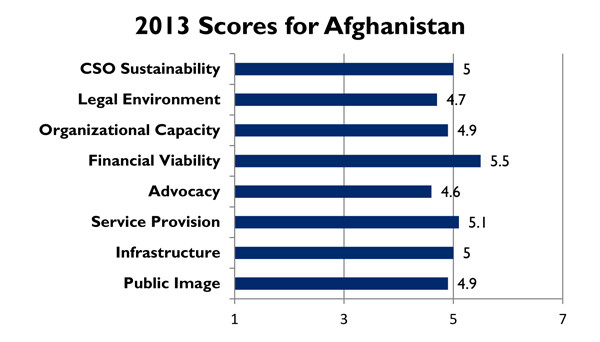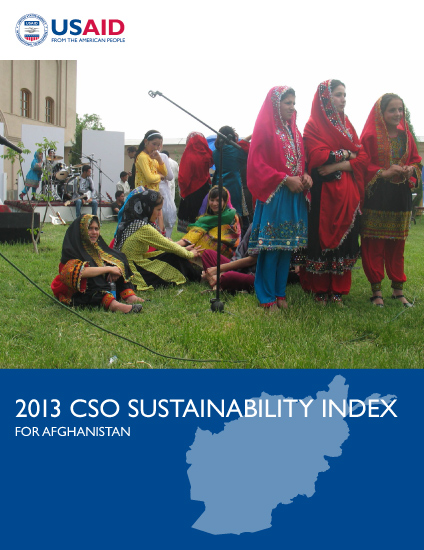- What We Do
- Agriculture and Food Security
- Democracy, Human Rights and Governance
- Democracy, Human Rights and Governance Strategy
- Supporting Free and Fair Elections
- Supporting Vibrant Civil Society & Independent Media
- Protecting Human Rights
- Promoting Accountability & Transparency
- Importance of Democracy, Human Rights, & Governance to Development
- Countering Trafficking in Persons
- Economic Growth and Trade
- Education
- Ending Extreme Poverty
- Environment and Global Climate Change
- Gender Equality and Women's Empowerment
- Global Health
- Water and Sanitation
- Working in Crises and Conflict
- U.S. Global Development Lab
Background
The 2013 CSO Sustainability Index (CSOSI) for Afghanistan looks at the sustainability of the civil society sector based on an assessment by local civil society representatives and experts. The CSOSI is an important tool for civil society organizations (CSOs), governments, donors and academics for understanding and measuring the sustainability of the CSO sector. This publication complements other editions of the CSOSI which together cover over sixty countries and territories in Central and Eastern Europe and Eurasia, Sub-Saharan Africa, the Middle East and North Africa, and Pakistan.
Approach
The Index scores seven interrelated dimensions of CSO sustainability: Legal Environment, Organizational Capacity, Financial Viability, Advocacy, Service Provision, Infrastructure, and Public Image. These scores are averaged to produce an overall score for CSO Sustainability. Details of the methodology can be found here.
Findings
Although still volatile, Afghanistan made important strides in the social, economic, and political spheres in 2013, as evidenced by acknowledgement at the 2013 Senior Officials’ Meeting (SOM) of the Tokyo Mutual Accountability Framework (TMAF) of the government’s progress in realizing its commitments under the TMAF.
In 2013, 1,911 domestic and 287 foreign NGOs were registered with the Ministry of Economy (MoE), and over 4,000 associations were registered with the Ministry of Justice (MoJ), more than two-thirds of which were registered in Kabul. There are also thousands of unregistered CSOs working in Afghanistan, including more than 20,000 community development councils, unregistered youth movements, and citizens advocating in urban areas for democratic causes. Traditional civil society is extremely important in Afghanistan, including shuras (community-based councils), jirgas (tribal assemblies of elders), village councils and Ashars (interim gatherings to settle local disputes). CSOs in Afghanistan operate in nearly all sectors, providing basic services such as housing, education, and health, as well as economic development, women’s empowerment, and the environment.
Five dimensions of sustainability improved in Afghanistan in 2013. The legal environment improved slightly with the passage of the Law on Associations which replaces the 2002 Law on Social Organizations and allows associations to access foreign funding and conduct advocacy. Although CSO relations with the government have improved, CSO efforts are hindered by several persistent issues, such as improper implementation and enforcement of laws. Organizational capacity, which varies by region, and financial viability also improved in 2013. Afghan CSOs are struggling to meet the challenges posed by the waning of donor contributions. There was an improvement in CSO advocacy in 2013, as well, and parliament was more receptive to CSO input, for example with regard to the Law on Elimination of Violence Against Women and the Law on Associations. CSOs have established a number of intermediary support organizations (ISOs), local and regional networks, coalitions, coordinating bodies, and umbrella organizations, which help develop and consolidate the sector.









Comment
Make a general inquiry or suggest an improvement.